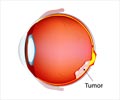The important role that clinical genetic evaluation can have in the management plan of patients with retinoblastoma, a childhood cancer of the eye, has been highlighted by results of a study

"Integrating genetic evaluation into retinoblastoma care helps in understanding whether the disease is inherited or not, and being armed with that information is important for patient screening as well as for determining at-risk relatives," said Dr. Shweta Dhar, assistant professor of molecular and human genetics and director of the adult genetics program at BCM, lead author of the paper.
Retinoblastoma affects about 350 infants and children in the United States each year and is the most common malignant tumor of the eye in children. Retinoblastoma is often curable, but may result in the loss of the eye.
The disease takes two forms. Bilateral retinoblastoma is inherited and can affect one or both eyes and is often seen in infants and younger children. Unilateral retinoblastoma affects only one eye and generally occurs in older children. It may or may not be hereditary.
The clinical team including ophthalmologists, pediatric oncologists, pathologists, geneticist and genetic counselors completed genetic evaluation of nearly 65 percent of patients. Testing that included both DNA sequencing and other more advanced tests, such as copy number analysis, resulted in a higher yield. Overall, the genetic analysis demonstrated the causative mutation in 90 percent of patients with bilateral retinoblastoma and documented the hereditary form of retinoblastoma in 17 percent of patients with unilateral retinoblastoma.
Knowing whether the patient's disease is hereditary helps determine whether the patient is at increased risk for other cancers in the future.
Advertisement
"Without genetic testing, most relatives, particularly infant siblings, of retinoblastoma patients undergo eye examinations under anesthesia to screen for tumors," explained Dr. Sharon Plon, professor of pediatrics – hematology/oncology and of molecular and human genetics at BCM and senior author of the study. "What we were able to show is that by systematically including genetic testing in the care of retinoblastoma patients we could eliminate the need for such screening in the majority of relatives and save both health care costs and potential risks of the anesthesia."
Advertisement
Source-Eurekalert















